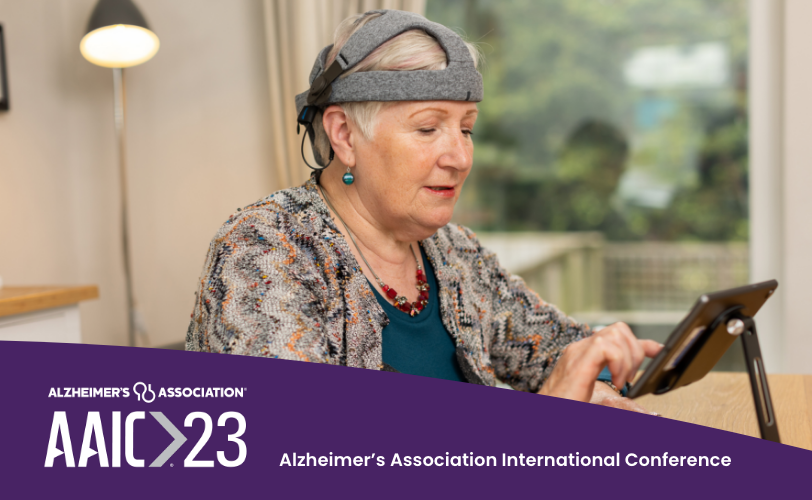First published: 17th July 2023

Cumulus Neuroscience presented interim data from our real-world feasibility study CNS-101 at the Alzheimer’s Association International Conference 2023 in Amsterdam, Netherlands. Using the proprietary Cumulus Neuroassessment Platform to gather data via repeated at-home sampling, the study is being conducted in collaboration with the University of Cambridge and Trinity Biomedical Science Institute.
Cumulus presented a poster titled, "Feasibility of real-world endpoints of functional neurophysiology in Alzheimer's disease dementia," which demonstrated that objective measures of a range of domains, including electroencephalogram (EEG), are user-friendly and suitable for repeated at-home use by patients and older controls. Patients living with Alzheimer's dementia (AD) demonstrated high compliance rates with the study protocol (75%), when compared to the compliance rates of healthy controls (83.3%) during the initial 2-week burst stage. Importantly, despite the intensive at-home sampling schedule, drop-out rates in this ongoing study continue to be very modest (AD patients, 20%; healthy controls, 6%). Initial analyses of key endpoints demonstrated that behavioral and EEG-based measures aligned strongly with traditional clinical benchmarks, constituting positive early evidence for construct validity and technical feasibility.
"This interim analysis has provided confirmation that patients living with Alzheimer's are capable and willing to participate in clinical studies that include at-home EEG, and that our platform is user-friendly and suitable for repeated at-home use. We were encouraged to see high compliance rates with the study protocol, and low dropout rates."
Brian Murphy, Ph.D.
CSO, Cumulus Neuroscience
"Clinic-based biomarkers are effective in tracking disease progression in clinical research but do not scale to support large real-world studies. Purely digital markers are scalable but lack objectivity," said Brian Murphy, PhD, Founder and Chief Scientific Officer of Cumulus. "This interim analysis has provided confirmation that patients living with Alzheimer's are capable and willing to participate in clinical studies that include at-home EEG, and that our platform is user-friendly and suitable for repeated at-home use. We were encouraged to see high compliance rates with the study protocol, and low dropout rates. We are grateful to all the study participants and research collaborators."
AD is a progressive disease that affects brain function, memory, and other cognitive abilities. It is the most common cause of dementia, affecting millions of people worldwide. Symptoms usually develop slowly and worsen over time, including memory loss, confusion, difficulty with language and communication, mood swings, and changes in behavior and personality. Currently, there is no known cure for AD.
In a second poster presentation, researchers from Boston University Chobanian & Avedisian School of Medicine presented data generated in part from the Cumulus Neuroassessment Platform titled, "Implementing wearable technologies for in home assessment of cognitive and event-related potential responses after sleep and wakefulness in Alzheimer disease." The primary aim of the study was to explore the feasibility of using wearable technologies to support the collection of quality clinical study data at home. The study demonstrated that this type of study design was well accepted by patients, and consistent with the Cumulus study findings, there were high levels of adherence to the study protocol.
“We were encouraged to see excellent levels of patient adherence to the study protocol. Importantly, the remote data captured in this study was of similar quality to data generated using traditional methods in house at Boston University."
Andrew Budson, MD
Professor of Neurology, Boston University Chobanian & Avedisian School of Medicine
"This pilot study offers proof of concept that at-home data collection leveraging wearable technologies has the potential to enable screening, staging and monitoring of brain function longitudinally in clinical studies," said Andrew Budson, MD, Professor of Neurology at Boston University Chobanian & Avedisian School of Medicine "We were encouraged to see excellent levels of patient adherence to the study protocol. Importantly, the remote data captured in this study was of similar quality to data generated using traditional methods in house at Boston University."
In the CNS-101 Study, patients with AD (N=59) and healthy controls (N=60) were recruited for a 1-year repeated sampling study in the UK. Patients were clinically assessed to have mild AD. Participants were asked to complete repeated home-based sessions of approximately 30 minutes of behavioral tasks including memory, executive function, affective processing, and language, while synchronized EEG was recorded using the Cumulus 16-lead EEG headset. All study participants completed a 2-week burst stage which included a total of 15 sessions.
Dr. Budson and his team receive funding and other resources from Bristol Myers Squibb and Cumulus Neuroscience.